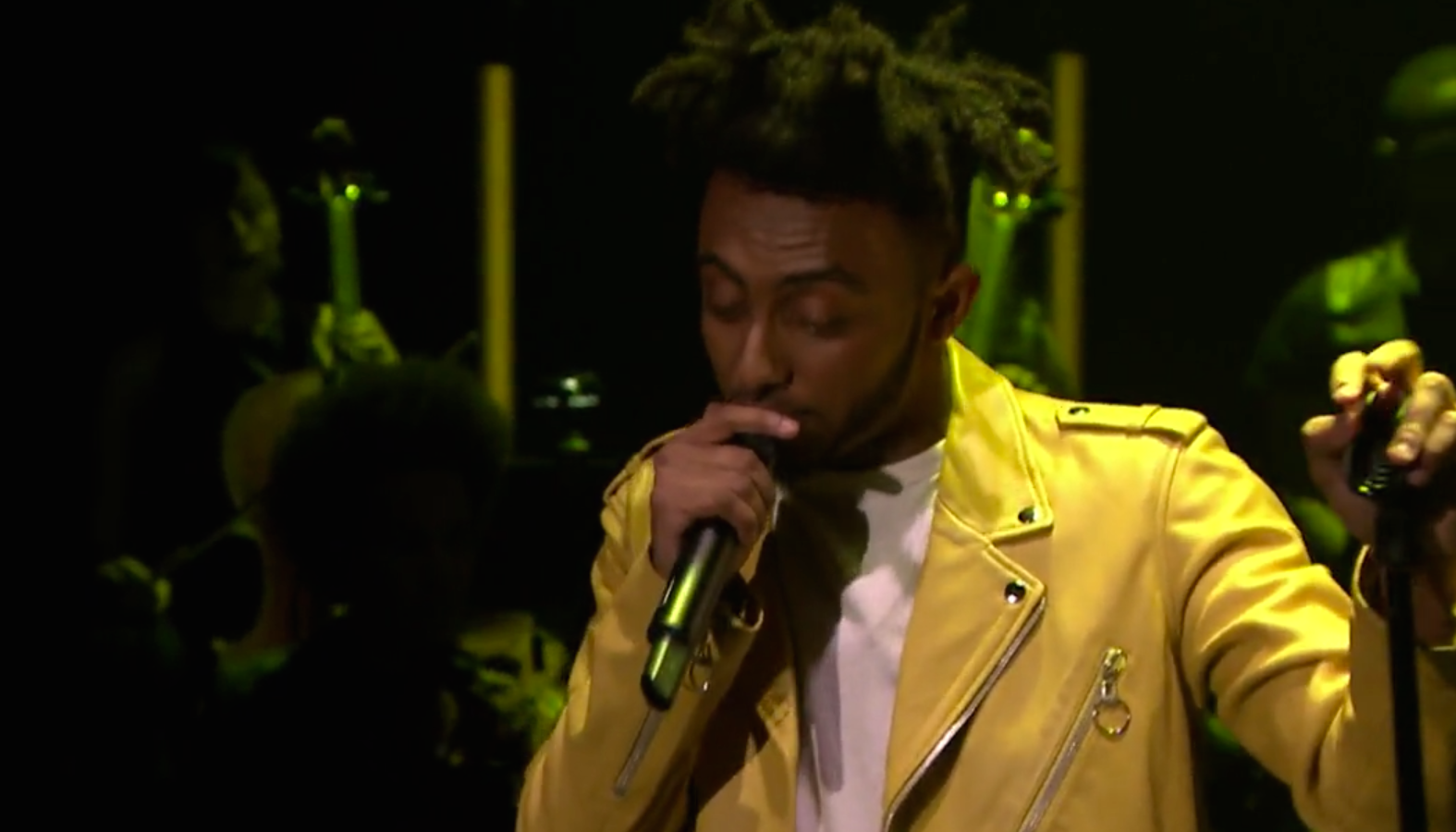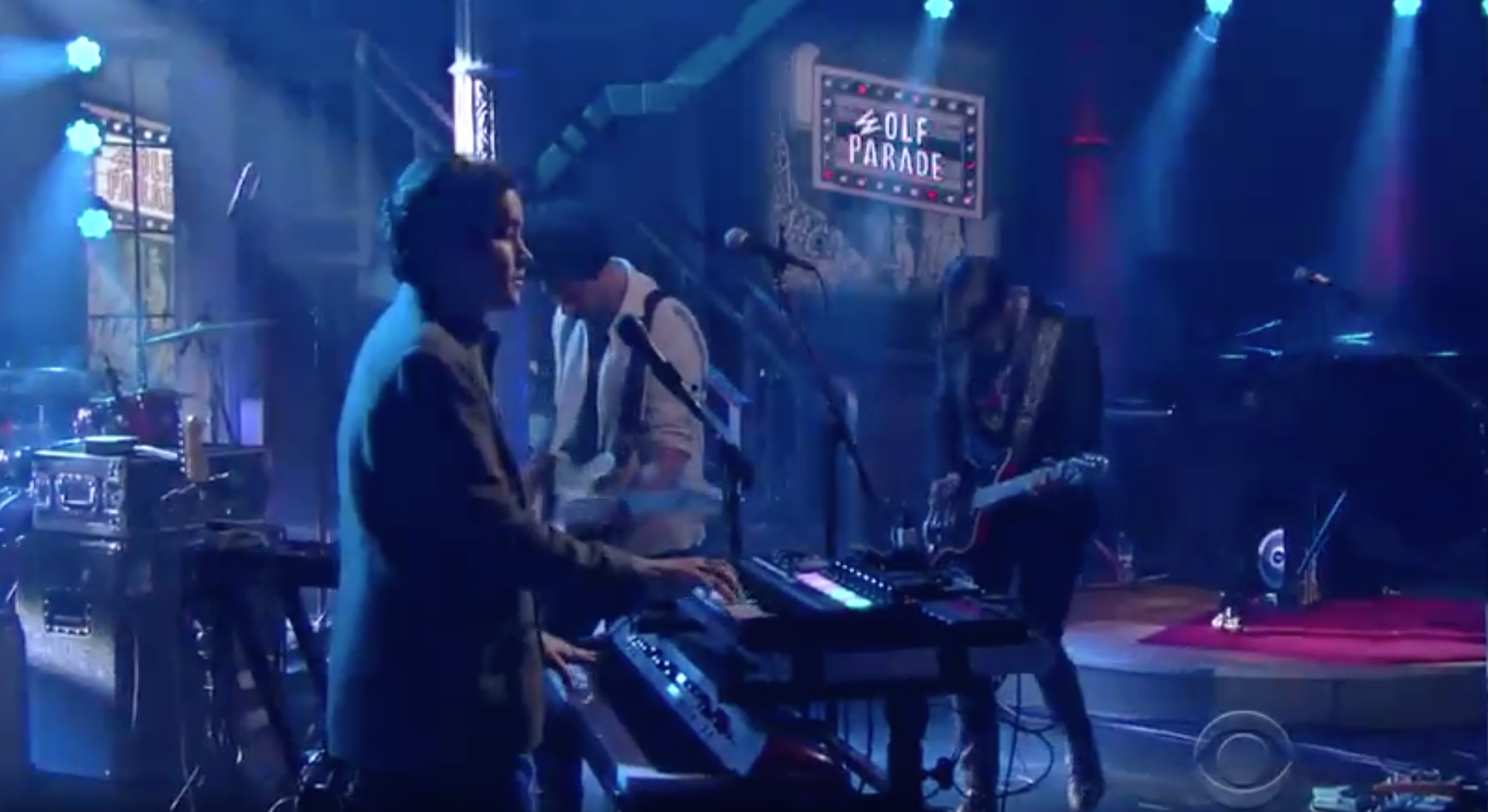10 najlepszych występów telewizyjnych późno w nocy w 2016 roku
Muzyczni goście w telewizji nocnej są jedną z ostatnich pozostałych monokultur konsumpcji muzyki, cieszącą się uznaniem zarówno mainstreamu, jak i undergroundu. Gdzie wszyscy mamy kontakt z muzyką na swoich warunkach, coraz bardziej podzieleni na platformy i kuratorów, nocna telewizja zawsze wydawała się wspólną nicią — przestrzenią, w której wszyscy możemy być, nawet jeśli na chwilę, w tym samym publiczności na jedną noc. Gdy każdy inny aspekt naszego kulturowego krajobrazu zmienia się i dostosowuje, organizacja muzyki nocnej pozostaje zaskakująco nienaruszona. Jest trwała, ale wciąż tętni życiem. Artystyczne gesty stworzone dla i dokumentowane przez telewizję narodową mogą w unikalny sposób uchwycić wielkie wprowadzenie artysty do ich najnowszej pracy, ustanawiając ton dla tego, jak rozumiemy ich wizję. W innych miejscach zespoły mogą zmienić uparty narratyw, w którym czują się uwięzione po dostarczeniu kulturowego kamienia milowego, który resetuje ich postrzeganie. Ta moc jest unikalna dla platformy; już nie słuchamy wspólnie radia, nie czytamy tych samych blogów ani nie uczestniczymy w tych samych koncertach, ale przynajmniej nadal razem oglądamy te same występy. Wznosimy toast za najlepsze chwile tego medium w ciągu ostatnich dwunastu miesięcy, i niech żyje nocna telewizja.
10. Beyoncé & The Dixie Chicks: “Daddy Lessons” (Live on the CMA’s)
While not technically a “late night” performance, I had to sneak this one in as a bonus of sorts since it was perhaps the most discussed music moment of television that took place at night this year. Beyoncé, not content with only having created perhaps the most significant music video/short film of recent history, decided she also needed to wipe out the memory of every other award show performance that took place in 2016. Seriously, I mean I can’t tell you who won a single Grammy this year, or really if those ever took place. But I still hear the ringing in my ears from this performance smashing through genre and demographic walls with the force of Yoncé’s mighty sledgehammer
9. Diarrhea Planet: “Aint a Sin to Win” (Live on Seth Myers)

One of the few progressive moments we had as a country in 2016 was the debut of Diarrhea Planet on national television. Better yet? It was as uncompromisingly glorious and histrionic as could be expected from a band with four guitarists and a name that until now likely precluded them from wider audiences. Rock and roll is never better than when it’s boiled down to its bare essentials, and then blows up those essentials to bombastic proportions. Diarrhea Planet doesn’t do nuance, but rather muscular riff-rock so sloppy it lingers later in your teeth. This is music that shouldn’t sell, but here they are sharing a taping audience with James Franco’s slightly less annoying younger brother. Cheers to success on your own counterintuitive terms. Watch this one here.
8. Amine: “Caroline” (Live on Jimmy Fallon)

I had never heard of Portland rapper Amine prior to this performance, but from his ridiculous banana-centric aesthetic down to the theatrical orchestra, he made sure I wouldn’t soon forget him. When I went back to the original source material, I was surprised to discover how much he formalized the music and presentation of “Caroline” for this Fallon spot. It was genuinely impressive, and even when I began to think, “Okay he’s talented, and this beat is wild, but he’s not really saying much,” he went off script and delivered an impassioned set of bars denouncing the newly elected Trump and the significance of being vocal against this regressive tide on these platforms. At a time when merely having a defined identity is to be inherently political, it’s nice to see even the most irreverent artists understand the importance of speaking truth to power. Watch this one here.
7. Hundred Waters: "Show Me Love" (Live on Stephen Colbert)
I saw Hundred Waters open a tiny Sacramento club a few years back, before their critically-approved atmospherics reached the “right” blogs that they did after releasing the excellent The Moon Rang Like A Bell. At that show they were nervous, but infectiously pleasant and carried with them a crystalline grace. I knew they’d have a bright future. But I also in no way expected that future to contain the likes of Skrillex, Chance The Rapper, and a certifiable pop smash. Yet damn do they own this newfound role, with frontwoman Nicole Miglis rocking toe to toe with Chance like she’s Haley Williams post-Paramore and not the timid flautist I pegged her for all those years ago. And of course Chance commands the stage with his at this point now iconic nasal-pitched vocal flourishes and pep rally wordplay. Altogether, Hundred Waters didn’t just show this crowd love, they revealed to them a whole new interpretation of their compelling sonic spell.
6. A Tribe Called Quest: “We The People…” (Live on SNL)
At long last indeed. From the unbelievable fact that Dave Chappelle gave the introduction to the tear-inducing portrait of the late Phife Dawg rolled out during his verse’s playback, this spot was significant, moving, and inspiring at a time when we all needed it. Over a Q-Tip production composed of industrial rust, Tribe protested modern xenophobia with their characteristic acrobatic lyricism imbued with a scorching urgency. All of this went down on the same stage that Phife lyrically condemned for almost exactly a year earlier having played host to a would-be now-soon-to-be fascist. Taking place only days following the election, there couldn’t have been a better time to have had these voices back with us — to not simply ease our anxieties about the state of the world, but to offer us the motivation to keep fighting.
5. DRAM: “Broccoli” (Live on Conan)
DRAM is goofy, but he’s endearing in the most joyous way. While it’s confusing that he thought what his jingle-rap banger needed was a syrupy, melodramatic intro and the drummer from Blink-182, it’s also kind of intoxicating. And this performance captures exactly why DRAM is so important of a figure in contemporary music. He’s an experimentalist, but without losing sight of the immediacy that makes music stick with us in the first place. Overtly positive hip-hop has the tendency to veer towards ingenuine at worst and ingratiating at best, but DRAM finds the right balance between cheeky and cheery, wielding a scathing tongue within a magnanimous smile. He’s truly ascended beyond all that fuck shit.
4. Vince Staples: "Smile" (Live on Fallon)
In which gangsta rap’s resident apathetic iconoclast offers dismal thoughts on racism both institutionalized and explicit, touching specifically on the demons of black men being exercised for entertainment while performing his own to a national audience with an unbreakably resigned conviction. Vince Staples, eyes low and with his hands shoved in his pockets, performed his* Prima Donna* crunch-rap anthem with a reserved reverence, the track’s menacing sleet and steel coming courtesy of Questlove and the Roots crew. “Smile” could be considered a sermon of sorts, but it’s a dismal one — his faith based in desperation rather than devotion. When Vince works himself up enough to finally open his eyes, he stares dead-on into the camera with a menacing remorse, knowing that no matter how many times he offers up his soul it probably won’t ever come back.
3. Wolf Parade: "Cest La Vie Way/Floating World" (Live on Colbert)

We didn’t deserve Wolf Parade coming back, but thankfully they did nonetheless. While EP4 didn’t reach any of the stratospheric highs of their back catalog’s best moments, it did serve as a reminder of the exceptional skillset this band has at their disposal in crafting songs both tender and tense, and even at their most unwieldy unequivocally anthemic. Much in the same way, this performance captures everything that we romanticized about the band in the years of their hiatus, specifically that eternal push and pull between Spencer Krug’s lyrical vignettes and Dan Boeckner’s more jagged melodies, delivered on top some of the most beautifully agitated music in indie rock. Watch this one here.
2. Kanye West ft. Chance The Rapper: "Ultralight Beam" (Live on SNL)

Kanye is a master of curation (see: that pixelated backdrop, the coordinated outfits and movements of the choir), yet he doesn’t let his singular vision get in the way of his unbridled creative spirit and childlike energy. It’s this enthusiasm that in part makes him such a compelling figure you want to root for in spite of how hard he tries to make you feel otherwise. Kanye’s truly the least essential piece of this whole performance (in fact, most of the time he actively makes it worse), but that’s not the point. The point is that he’s the reason we have any of this at all — Kelly Price’s doubts resolving into conviction, Kirk Franklin’s prayer for “everyone that feels they're not good enough” — and when he passes the torch for a show-stealing soliloquy from his spiritual protégé, he’s reminding you that he’ll live through his disciples long after all the dust settles from his critics getting themselves all worked up. Watch this one here.
1. Chance The Rapper ft. Anthony Hamilton, Ty Dolla $ign, DRAM, and Raury: "Blessings" (Live on Fallon)
Chance the Rapper had a better year than perhaps anyone this side of Beyoncé, and routinely made late night his space to demonstrate just why all the hype is so well deserved. Performing the stunning closer of his acclaimed Coloring Book, Chance acts as the conductor of an all-star crew featuring Anthony Hamilton, Ty Dollar $ign, Raury, DRAM, and his own band The Social Experiment. Yet he also vocalizes his poetry of glory with the conviction of a man speaking alone to God himself. That is until he softens his face in the last half, walks out into the audience, and leads a gospel choir out in the rafters to bring the crowd, and with the ambition of if speaking to the entire world, in on his cry for benediction. It’s a perfectly executed artistic statement — Chance taking the baton from Kanye and becoming for himself the most significant artist in music right now, or at the very least, making us “remember how to smile good.” These days, that alone can feel like changing the world.
Pranav Trewn is a general enthusiast and enthusiastic generalist, as well as a music writer from California who splits his time between recording Run The Jewels covers with his best friend and striving to become a regular at his local sandwich shop.
Dołącz do klubu!
Dołącz teraz, począwszy od 44 $Ekskluzywna 15% zniżka dla nauczycieli, uczniów, członków wojska, profesjonalistów w dziedzinie zdrowia & pierwszych ratowników - Zweryfikuj się!




